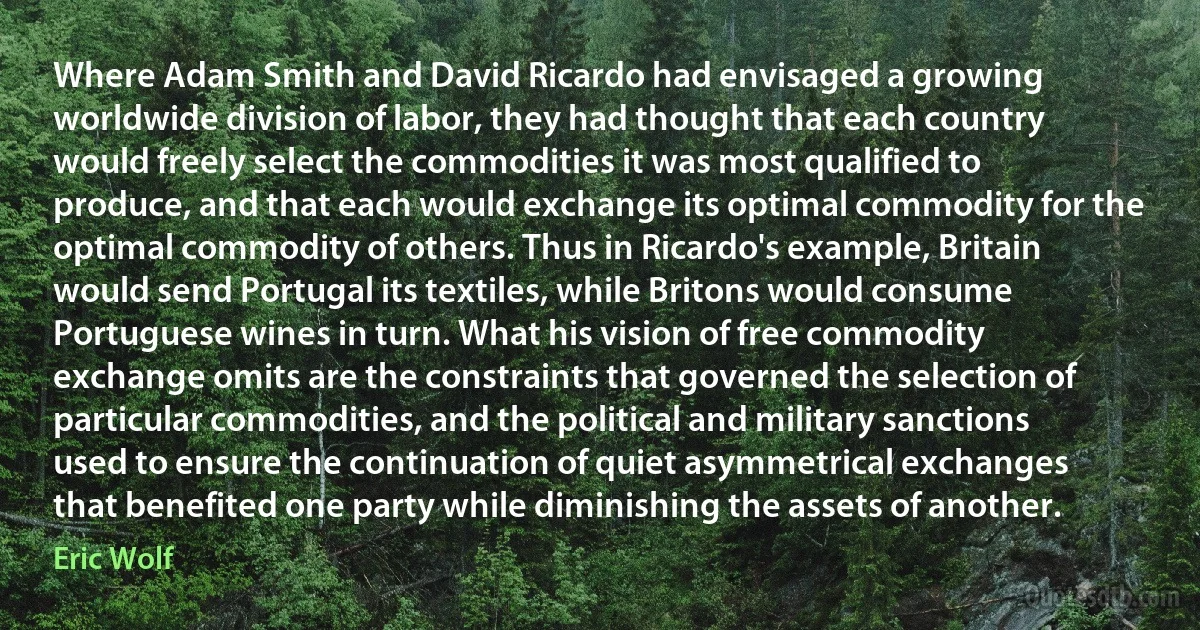
Where Adam Smith and David Ricardo had envisaged a growing worldwide division of labor, they had thought that each country would freely select the commodities it was most qualified to produce, and that each would exchange its optimal commodity for the optimal commodity of others. Thus in Ricardo's example, Britain would send Portugal its textiles, while Britons would consume Portuguese wines in turn. What his vision of free commodity exchange omits are the constraints that governed the selection of particular commodities, and the political and military sanctions used to ensure the continuation of quiet asymmetrical exchanges that benefited one party while diminishing the assets of another.
Eric WolfRelated topics
adam assets continuation country example free growing labor party produce quiet selection send thought thus turn vision while others Britain optimal Portugal Ricardo textilesRelated quotes
Because Africans and Americans share a belief in the values of liberty and dignity, we must share in the labor of advancing those values. In a time of growing commerce across the globe, we will ensure that the nations of Africa are full partners in the trade and prosperity of the world. Against the waste and violence of civil war, we will stand together for peace. Against the merciless terrorists who threaten every nation, we will wage an unrelenting campaign of justice. Confronted with desperate hunger, we will answer with human compassion and the tools of human technology. In the face of spreading disease, we will join with you in turning the tides against AIDS in Africa.

George W. Bush
Our country is suffering from the lack of food. We don't have rice for the military. Our country is in a state of anarchy because of the dysfunctional food rationing system. The administration department is responsible for this mess, as well as the Party officials. The Party's Central Committee members have failed their duty in generating a revolutionary spirit, diminishing the Party's effectiveness. We must solve the food problem according to socialist principles, and we must not rely on individuals. If we let the people solve the problem on their own, only merchants and markets will prosper. Then, selfishness will rule our society and destroy our system of true equality.

Kim Jong-il
One of the most important axioms is, that as the quantity of any commodity, for instance, plain food, which a man has to consume, increases, so the utility or benefit derived from the last portion used decreases in degree. The decrease in enjoyment between the beginning and the end of a meal may be taken as an example. And I assume that on an average, the ratio of utility is some continuous mathematical function of the quantity of commodity. This law of utility has, in fact, always been assumed by political economists under the more complex form and name of the Law of Supply and Demand. But once fairly stated in its simple form, it opens up the whole of the subject.

William Stanley Jevons
The societies to which most readers of this book belong represent a narrow slice of human cultural diversity. Societies from that slice achieved world dominance not because of a general superiority, but for specific reasons: their technological, political, and military advantages derived from their early origins of agriculture, due in turn to their productive local wild domesticable plant and animal species. Despite those particular advantages, modern industrial societies didn't also develop superior approaches to raising children, treating the elderly, settling disputes, avoiding non-communicable diseases, and other societal problems. Thousands of traditional societies developed a wide array of different approaches to those problems.

Jared Diamond
Why do I need this protection? I am not a president or a king; I am a mere member of the Dutch Parliament, one of 150 elected parliamentarians in the Tweede Kamer, the House of Representatives of the Netherlands, a small country of 16.5 million in Western Europe. However, I have joined Westergaard in a rapidly growing group of individuals throughout the world who have been marked for death for criticizing Islam. For asserting our rights to say what we really think about this political ideology that disguises itself as a religion, we have been hounded by Muslims seeking to make an example of us. Offend us, they are saying to the world, and you will end up in hiding like Wilders, attacked like Westergaard, or dead like van Gogh.

Geert Wilders
